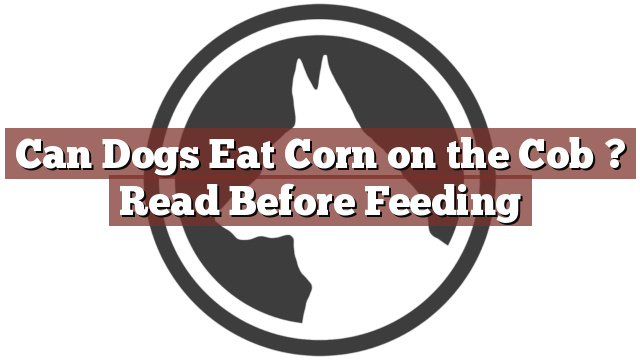Understanding Your Dog’s Dietary Needs
As a responsible pet owner, it’s important to understand your dog’s dietary needs. While dogs are omnivores and can eat a variety of foods, not all human foods are safe for them. Feeding your dog a balanced diet is crucial to their overall health and well-being. It’s essential to be aware of potential risks and consult your veterinarian before introducing any new food into your dog’s diet.
Can Dogs Eat Corn on the Cob? Read Before Feeding
Can dogs eat corn on the cob? This is a common question among dog owners. The answer to this question is no. Although corn is not toxic to dogs, the cob can pose a choking hazard and can cause intestinal blockage if ingested. Dogs have a tendency to swallow large chunks of food without chewing properly, and the cob can easily become lodged in their digestive system. It’s best to avoid feeding your dog corn on the cob to prevent any potential health issues.
Pros and Cons of Feeding Corn on the Cob to Dogs
While corn on the cob may seem like a tempting treat for your furry friend, it’s important to consider the pros and cons before feeding it to them. One potential benefit of corn is its nutritional value. It contains essential vitamins and minerals such as vitamin B and fiber, which can be beneficial for dogs. However, these nutrients can be found in other dog-friendly foods that are safer and easier to digest.
On the other hand, the cons of feeding corn on the cob outweigh the potential benefits. The cob poses a significant choking and obstruction risk, which could lead to a costly and potentially life-threatening emergency trip to the vet. Moreover, corn is high in carbohydrates, which can contribute to weight gain and other health issues such as diabetes in dogs. It is crucial to prioritize your dog’s safety and health by avoiding feeding them corn on the cob.
Conclusion: Consider Alternatives Before Feeding Corn on the Cob to Your Dog
In conclusion, while corn itself may not be harmful to dogs, feeding them corn on the cob is not recommended. The cob poses a choking hazard and can lead to intestinal blockage. It’s important to prioritize your dog’s safety and well-being by offering them alternative, dog-friendly foods that provide similar nutritional benefits without the associated risks. If you are unsure about what foods are safe for your dog, consult with your veterinarian who can provide you with the best dietary recommendations based on your dog’s specific needs. Remember, a healthy and balanced diet is the key to a happy and thriving furry friend.
Thank you for taking the time to read through our exploration of [page_title]. As every dog lover knows, our furry friends have unique dietary needs and responses, often varying from one canine to another. This is why it's paramount to approach any changes in their diet with caution and knowledge.
Before introducing any new treats or making alterations to your dog's diet based on our insights, it's crucial to consult with a veterinarian about [page_title]. Their expertise ensures that the choices you make are well-suited to your particular pet's health and well-being.
Even seemingly harmless foods can sometimes lead to allergic reactions or digestive issues, which is why monitoring your dog after introducing any new food item is essential.
The content provided here on [page_title] is crafted with care, thorough research, and a genuine love for dogs. Nevertheless, it serves as a general guideline and should not be considered a substitute for professional veterinary advice.
Always prioritize the expert insights of your veterinarian, and remember that the health and happiness of your furry companion come first.
May your journey with your pet continue to be filled with joy, love, and safe culinary adventures. Happy reading, and even happier snacking for your canine friend!

